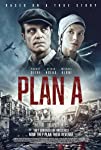Eye For Film >> Movies >> Plan A (2021) Film Review
Plan A
Reviewed by: Jennie Kermode

One of the first things one learns if one studies trauma is that everybody responds to it differently. Some people are able to pick themselves up and get on with their lives. Some make a good go of that, only to fall apart years later. Some fall apart straight away, sometimes resulting in suicide. Others can think of nothing but a driving need to get revenge.
Traumatise six million people and it’s inevitable that there will be some extreme examples of the latter.

Set in the immediate aftermath of the Second World War, the latest work from the Paz brothers is a film which demolishes comfortable myths about how Europe pulled itself back together. It follows Max (August Diehl), a Jewish survivor who first instinct is simply to return to the farm where he lived before it all kicked off, but who finds the German man who has taken it over still quite willing to kill people like him, war or not. With chaos all around him, there’s nowhere he can turn to help. He’s lucky to fall in with a group of American soldiers who are shipping refugees off to safety, but remembering the fate of his family, Max isn’t ready to leave – so a sympathetic soldier hooks him up with the Jewish Brigade, who spent several months during that period hunting down Nazis, giving them brief, informal trials and then gunning them down in the woods.
This is a response which most people who reflect on what Max has been through will have some sympathy for. Elsewhere, however, others are taking a more extreme approach. A group of survivors in Nuremberg concerns itself not just with active Nazis but with all those people who voted for them or stood by whilst Jews were persecuted. Having enough in common with that way of thinking to be convincing, Max is chosen to infiltrate it in the hope of preventing a terrorist act (which, his backers fear, would make the treatment of Jews much worse and almost certainly dissuade the international community from accepting Israel as a nation. Though he is treated with suspicion at first, he gradually finds a place within it, and once there, it’s not long before he hears the haunting words “Six million of them for six million of us.”
With such complex moral issues at its heart and such a weight of emotion, it isn’t difficult for the film to maker an impression, but the nuance established by the actors is what really sells it. Diehl is excellent as always, keeping us hooked but also keeping us guessing as to Max’s ultimate course of action. The more time he spends with the would-be terrorists, the more he comes to sympathise with their position. Some of them, however, are going in the other direction. Sylvia Hoeks is magnetic as the brittle Anna, a woman who has suffered a horrific personal loss which has left her struggling to function, who is caught between blind fury and a growing awareness that traces of what she lost still remain elsewhere in the world, and that she could still have a different future. The fierceness of her connection with Max speaks to the hungers often occasioned by catastrophe, but with both of them so damaged, there are no guarantees as to what it might mean.
Ishai Golan plays the group’s fanatical leader, convinced of the necessity of his actions, driven to commit himself more fervently when others drift away. We see relatively little of him, but enough to illustrate the attractiveness of any kind of conviction in such an uncertain world. The Paz brothers keep reminding us what’s at stake with small observations of people going about their day to day lives. In the water plant where Max gets a job, he is befriended by a German soldier just back from the Russian front, a conscript who helps him when, still weak from years of starvation, he struggles to keep up with the work. Alongside him, however, are men who make anti-Semitic remarks, and at one point we see a group of women become ferociously aggressive in their hatred of Jews. There is a constant sense that such hatred could boil over again into another pogrom.
A well written script draws out the rich history of the period without overwhelming viewers, though Yoav Paz has said that he would have loved to have room to include more details. The film holds together well as a thriller, and even if you are familiar with the historical events on which it is based, you will find yourself watching nervously. It also has an additional dimension, in that its position in the past and the established horror of the Holocaust enables it to explore the psychology of terrorism in a way which is difficult to do with more recent material. In so doing, it raises another question: why, given all the horrors of the world, are such destructive responses not more common? It’s in that question, perhaps, that hope lies.
Reviewed on: 07 Oct 2022

















